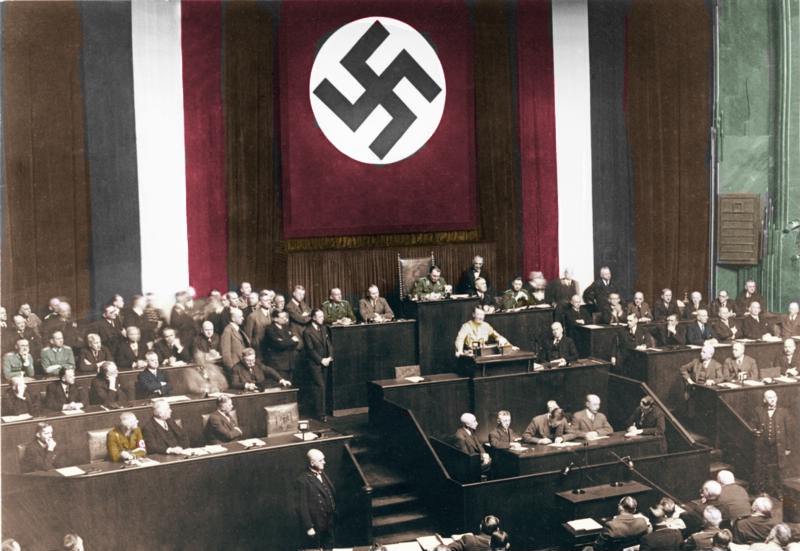The UK’s Enabling Act?

The Enabling Act (German: Ermächtigungsgesetz) of 1933, formally titled Gesetz zur Behebung der Not von Volk und Reich (“Law to Remedy the Distress of People and Reich”), was a law that gave the German Cabinet—in effect, the Chancellor—the power to enact laws without the involvement of the Reichstag, and to override fundamental aspects of the Weimar Constitution. The Enabling Act gave Hitler plenary powers and followed on the heels of the Reichstag Fire Decree, which had abolished most civil liberties and transferred state powers to the Reich government. The combined effect of the two laws was to transform Hitler’s government into a legal dictatorship.
Although the Enabling Act initially was limited to a maximum of four years, it was never difficult to renew it once the dictatorship was in place.
The point of this history lesson is that a democratically elected parliament has to be very careful that it doesn’t sign too many powers over to the government, even if they believe at the time it’s for a good reason and only for a limited amount of time.
I have to admit I’m very worried about the potential consequences of the proposed Internal Market Bill (PDF). Other people have written a lot already about how it’s wreaking havoc with devolution (because it allows the UK Government to overrule the devolved governments, almost without any constraints) and making the EU and others very unhappy because it’s changing the Withdrawal Agreement unilaterally, breaking international law in the process, so I won’t go into that here.
I noticed, however, that some legal commentators on Twitter were comparing it to the German Enabling Act, so I decided to have a look. As far as I can tell, the dangerous passage is this one (I’ve underlined a few bits):
42 Power to disapply or modify export declarations and other exit procedures
(1) A Minister of the Crown may by regulations make provision about the
application of exit procedures to goods, or a description of goods, when
moving from Northern Ireland to Great Britain.
(2) That includes any exit procedure that is applicable by virtue of the Northern Ireland Protocol or otherwise.
(3) The following matters (in particular) may be taken into account when a
Minister of the Crown is exercising the power conferred by subsection (1)—
[…] (b) the need to maintain and strengthen the integrity and smooth operation of the internal market in the United Kingdom.
[…] (5) Such provision may include provision for rights, powers, liabilities, obligations, restrictions, remedies and procedures that would otherwise apply, as a result of relevant international or domestic law, not to be recognised, available, enforced, allowed or followed. […]
“relevant international or domestic law” includes—
[…] (g) any other legislation, convention or rule of international or
domestic law whatsoever, including any order, judgment or
decision of the European Court or of any other court or tribunal; […]
The government position seems to be that all of this is limited to specific provisions relating only to Northern Ireland, but they’ve used “other” far too often for my liking. I have a niggling feeling that a malevolent government can use this to change any law they want “by regulation” (i.e., ignoring Parliament), by stating it’s relating to “other exit procedures” and that it’s needed to “maintain and strengthen the integrity and smooth operation of the internal market in the United Kingdom”; doing this, they can even override a judgment made by the UK Supreme Court or “any domestic law whatsoever”. This could for instance be used to postpone the next general election indefinitely.
Perhaps I’m just having nightmares, but I sincerely hope the law won’t get passed in the current form. Even if Boris Johnson doesn’t have any aspirations to be a fascist dictator, this law could well enable somebody else to take on that role. It’s not a law that any democratic country should pass.
To what extent can this be modified by the general Henry VIII powers granted in the EU Exit Act, and the WA Act?
They seemed to grant sweeping powers for a minister by regulation to modify any existing (and possibly subsequent?) legislation as they deemed necessary for “tidying up”, not simply modifying SI’s, but also modifying primary legislation.
So to the extent that it isn’t currently an “enabling act”, could a Minister convert it in to one?
Pingback: Wake me up when independence is actually moving closer – Arc of Prosperity